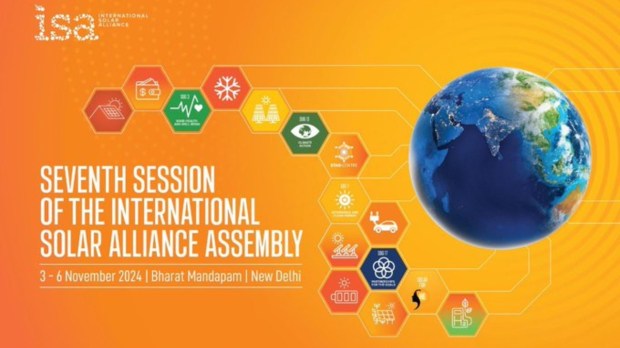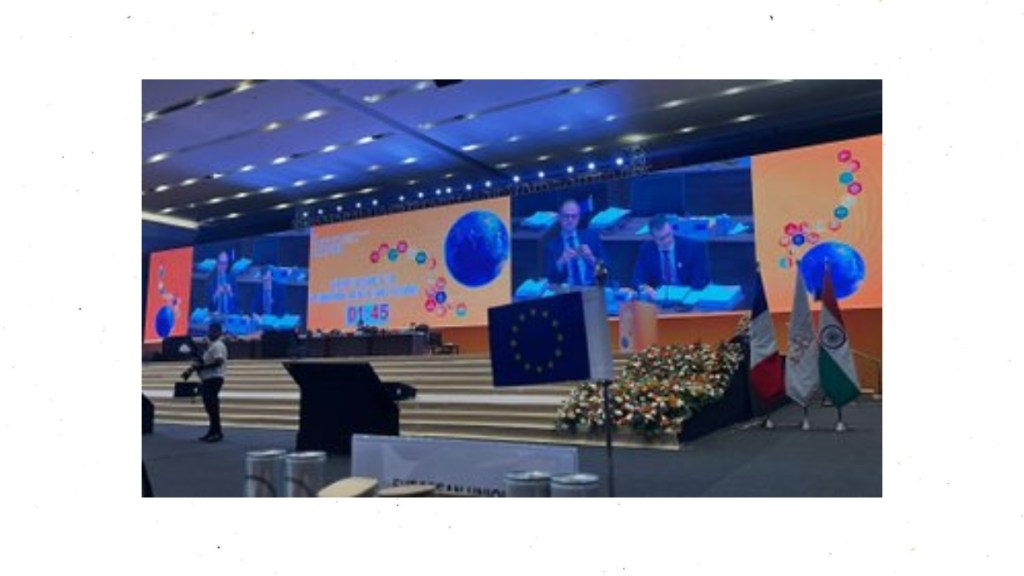The International Solar Alliance (ISA) convened its seventh Assembly session in New Delhi, where representatives from 29 countries gathered to review recent successes and chart the future course of solar energy collaboration. The event underscored ISA’s commitment to transforming solar energy access across its 120 Member and Signatory nations.

Minister for New and Renewable Energy, Pralhad Joshi, opened the session by highlighting ISA’s recent achievements and its growing role in reshaping the global energy landscape. “Solar energy, once an ambitious vision, has become a powerful reality,” he remarked, emphasizing how ISA has evolved from concept to active force for sustainable energy. Joshi revealed that ISA had completed 21 out of 27 demonstration projects, each showcasing the potential of solar power to drive sustainable growth, particularly in Least Developed Countries (LDCs) and Small Island Developing States (SIDS). “These successful projects,” Joshi noted, “are a testament to our shared commitment to a sustainable future.”
The Assembly also brought attention to key ISA initiatives aimed at accelerating solar development in underserved regions. The Global Solar Facility, for instance, is mobilizing commercial investment to fund solar infrastructure in areas with limited energy resources. A pilot project, already underway in the Democratic Republic of Congo, has attracted USD 39 million in pledged support from major partners, with hopes of making this facility operational by the upcoming COP29.
In addition, the Solar Data Portal was introduced as a valuable tool for governments, investors, and project developers. By providing real-time data on solar resources and investment potential, the portal aims to improve decision-making and transparency, empowering stakeholders worldwide to engage with solar projects more effectively.
Another highlight of the Assembly was the SolarX Startup Challenge, a program dedicated to nurturing groundbreaking solutions within the solar sector. This year’s challenge awarded 30 promising startups from the Asia-Pacific region, with preparations underway to expand the competition to Latin America and the Caribbean. The goal is to drive innovation and support entrepreneurs who can help tackle the unique challenges in solar technology development.
ISA Director General Dr Ajay Mathur praised the cooperative spirit of member countries and noted the Assembly’s role in setting a collaborative path forward. “Our collective presence here underscores our commitment to find solutions and share expertise to fuel a new era of solar transformation,” he stated. Mathur added that ISA’s initiatives have strengthened its position as a global leader in solar advocacy, fostering partnerships and expanding knowledge sharing.
Beyond showcasing current projects, the Assembly addressed future plans, including the Viability Gap Funding (VGF) Scheme. This initiative offers grants covering up to 35% of solar project costs for eligible projects in LDCs and SIDS, as long as 90% of the project’s financing is secured. By reducing financial barriers, the VGF Scheme aims to incentivize solar projects in regions most in need of sustainable energy solutions.
France’s Minister of State for Development, Thani Mohamed Soilihi, who serves as ISA Co-President, reaffirmed France’s support for ISA’s mission via a video message. France recently renewed its commitment to fund ISA projects with a EUR 1.5 billion pledge, which Soilihi noted would support ISA’s programs in local capacity building, improved financing access for developing economies, and the expansion of ISA’s global influence.
The Assembly concluded with discussions on budget priorities and future work plans. An election for the new President and Co-President of ISA took place, with elected leaders set to guide the Alliance through the next two years. Additionally, ISA’s flagship report series, World Solar Reports, will release its latest findings, offering insights into technology and investment trends in solar energy.
As a practical component of the Assembly, delegates will have an opportunity to visit an agrivoltaic farm, where solar panels and agricultural activities coexist, demonstrating ISA’s dedication to multi-functional solar applications that benefit both energy production and local economies.
The ISA Assembly closed with a renewed commitment to accelerating solar deployment worldwide, with special emphasis on projects that bridge resource gaps and promote sustainable growth across regions. Through initiatives like these, ISA remains at the forefront of global efforts to make clean energy accessible for all.
